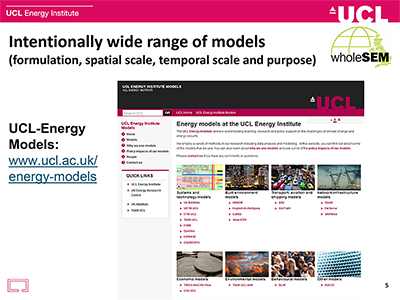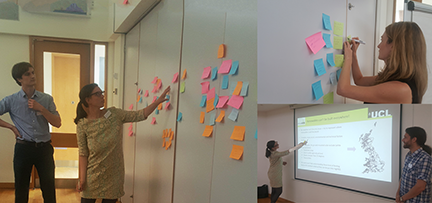The whole systems energy modelling consortium (wholeSEM) is a ground breaking multi-institution initiative to develop, integrate and apply state-of-the-art energy models.
Energy models provide essential quantitative insights into the 21st Century challenges of decarbonisation, energy security, energy equity, and cost-effectiveness. Models provide the integrating language and framework that assists energy policy makers – focusing at different scales and time periods – to make improved decisions and trade-offs in conditions of pervasive uncertainty. Whole systems energy modelling also has a central role in helping energy supply companies to make technical and economic decisions with regard to future energy technologies and infrastructure, as well as in the assessment of the potential role of societal and behavioural change.
wholeSEM has now concluded, a final word from Professor Neil Strachan:
“Energy models provide the integrating language and essential quantitative insights into these 21st Century challenges of decarbonisation, energy security and cost-effectiveness. The wholeSEM consortium ran from 2013 to 2017 and played a fundamental underpinning role in the UK’s strategic energy modelling activity.
The attached presentation was successively presented to key UCK energy policy stakeholders – Department of Business, Energy and Industrial Strategy (BEIS), Committee on Climate Change (CCC), Office of Gas and Electricity Markets (OFGEM) and the Energy Systems Catapult (ESC). It discusses how wholeSEM fulfilled its research goals through the development and documentation of major modelling tools, with a wide set of academic publications and conference presentations. The outreach function of wholeSEM to bind together the UK modelling community is discussed through four international leading annual energy conferences, a series of specialist events and an innovative bilateral Fellowship programme. The policy impact of wholeSEM is seen in the major contributions to key developments, including CCC’s 5th carbon budget, and BEIS’ Clean Growth Strategy.
Perhaps most innovative was wholeSEM breaking new ground on interdisciplinary energy modelling, addressing the conceptual and practical difficulties of truly cross-disciplinary analysis and insights. As Principal Investigator of wholeSEM, it has been my privilege to work with our four partner universities and with our Advisory Board over the last 4 years.” Professor Neil Strachan
wholeSEM News


Energy Modelling for UK Policy Insights: Successes, failures, lessons and future directions
12 March 2018
“Energy models provide the integrating language and essential quantitative insights into these 21st Century challenges of decarbonisation, energy security and cost-effectiveness. The wholeSEM consortium ran from 2013 to 2017 and played a fundamental ...
UCL launches landmark data analytics and energy systems Master's
21 November 2017

Energy Modelling for UK Policy Insights: Successes, Failures, Lessons and Future Directions
Seminar delivered by Professor Neil Strachan, Whole Systems Energy Modelling consortium (wholeSEM), to the Department for Business, Energy and Industrial Strategy (BEIS) on Thursday, 28 September 2017.
Workshop Exploring Qualitative Uncertainty in UK Decarbonisation Pathways
The Whole Systems Energy Modelling Consortium (wholeSEM) hosted this one-day workshop in conjunction with the Energy Technologies Institute (ETI) on Thursday, 14 September 2017. The workshop was attended by a range of experts ...
High Spatial and Temporal Resolution Electricity Model (highRES)
As part of wholeSEM, researchers at the UCL Energy Institute have developed the high spatial and temporal resolution electricity model (highRES). This video explains the model. Please get in touch with James Price ...
Stakeholder Engagement Study: What are the social issues affecting wind energy deployment
REAccept is a project aiming to improve the social acceptance representation of our energy system models, starting with onshore wind energy and highRES[1], funded by the BSEER Strategic Development Fund and wholeSEM ...
wholeSEM Events


What should the UK's climate targets be in the post-Paris Agreement era?
28 June 2017
The United Kingdom was the first country to sign binding emissions reduction targets into law in 2008, and has been a strong proponent of global action on climate change for the last decade.
Energy Pathways under Deep Uncertainty: What do Decision Makers Really Think is Important?
30 March 2017
The Energy Technologies Institute (ETI) and the Whole Systems Energy Modelling consortium (wholeSEM) are inviting participants to a 2 hour workshop on the ETI's latest research collaboration with the UCL Energy Institute.
Annual Conference July 2017: The Past, Present and Future of Energy Modelling
03 - 04 July 2017
Keynote
wholeSEM Stakeholder Event: Top Down Integration Project - Challenging the Feasibility and Key Elements of a Long Term Decarbonisation Pathway
30 November 2016
Models are often relied upon by policy makers to provide evidence that informs the decision-making process. But what kind of evidence is needed? How is uncertainty communicated? And based upon what assumptions?
BIEE Oxford Research Conference: Innovation and Disruption: the energy sector in transition
21 - 22 September 2016
How will innovation transform the energy sector in the next 5-10 years?
Join Professor Neil Strachan and members of the wholeSEM consortium at BIEE’s 11th Oxford research conference for two days of ...

Annual Conference 2016: Energy Modelling Insights for Iterative Decision Making
04 - 05 July 2016
Our 3rd Annual Conference combines our strands of thinking that try to model the future energy pathways under uncertainty where the demands of policy makers and indeed the framing of the issues are ...
